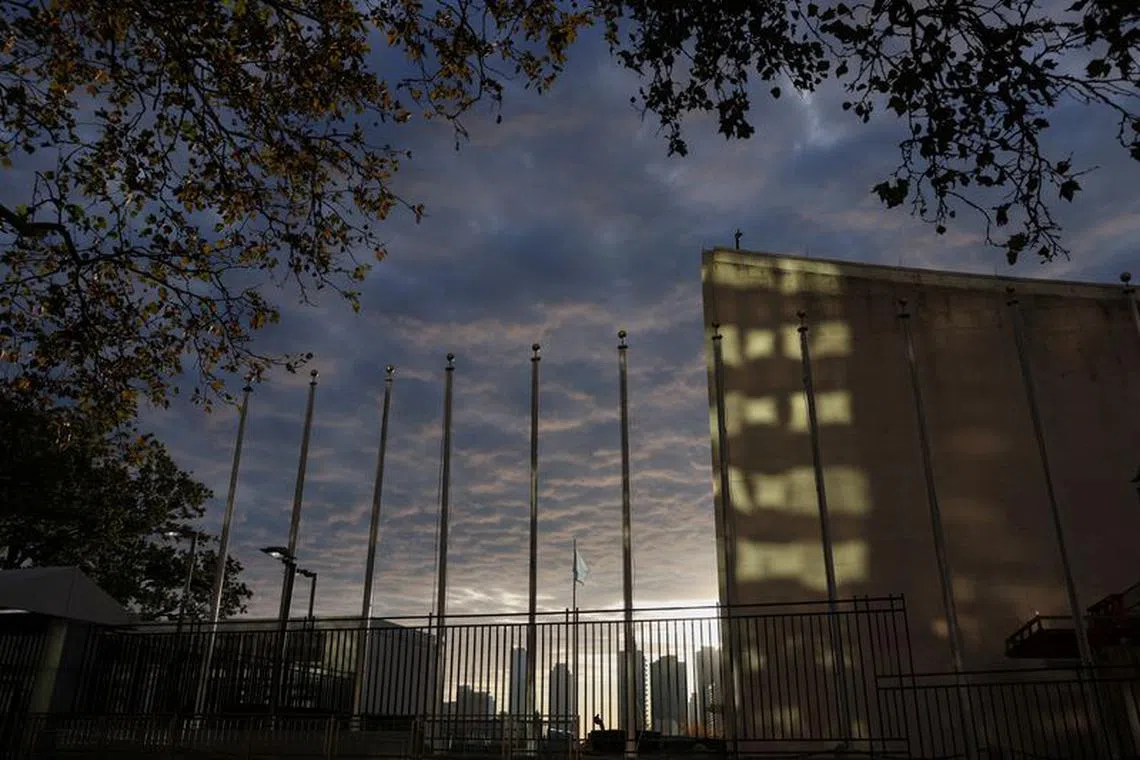To cease fire or pause? US, Russia poised for UN showdown on Israel
Sign up now: Get ST's newsletters delivered to your inbox

The US has called for pauses to allow aid to enter Gaza, while Russia wants a humanitarian ceasefire.
PHOTO: REUTERS
UNITED NATIONS – The United States and Russia have put forward rival plans at the United Nations to help Palestinian civilians caught in the Israel-Hamas conflict in the Gaza Strip: a humanitarian pause or a ceasefire.
Both countries seek UN Security Council resolutions to address shortages of food, water, medical supplies and electricity in Gaza.
But the US has called for pauses to allow aid to enter Gaza, while Russia wants a humanitarian ceasefire.
A pause is generally considered less formal and shorter than a ceasefire.
While the differences may seem semantic, the US proposal for pauses has grown out of an initial draft given to the 15-member council on Oct 21 that was staunchly pro-Israel, Washington's long-time ally.
Russia announced on Tuesday that it could not support the US plan for action and put forward its own text that calls for a ceasefire, an idea backed by Arab states.
A council resolution needs at least nine votes and no vetoes by the US, France, Britain, Russia or China to be adopted.
It is not immediately clear if or when the US and Russian draft resolutions could be put to a vote.
US Secretary of State Antony Blinken made the case for the US draft resolution at a Security Council meeting on Tuesday.
He said the body has a crucial role to play and that the US text “sets out practical steps”.
The US last week vetoed a Brazil-drafted resolution for humanitarian pauses.
Washington argued that time was needed for US-led diplomacy focused on brokering aid access to Gaza on the ground and trying to free hostages held by Hamas.
Twelve members voted in favour of the draft text on Wednesday, while Russia and Britain abstained.
The US then proposed its own draft text on Oct 21.
The text initially shocked some council diplomats with its bluntness in stating that Israel has a right to defend itself and demanding Iran stop exporting arms to militant groups in the region.
The US did not initially call for any pause or truce.
But – responding to growing international pressure – it amended the draft to include a call “for all measures necessary, such as humanitarian pauses” to allow aid access.
The US also toned down the overall draft, removing direct references to Iran and to Israel’s right to self-defence.
Russia alternative
But Russia put forward its own alternative draft resolution on Oct 24 after saying it does not support the proposed US action.
“The whole world is expecting from the Security Council a call for a swift and unconditional ceasefire,” Russia’s UN Ambassador Vassily Nebenzia told the Security Council. “This is precisely what is not in the American draft. Therefore, we don’t see any point in it, and we cannot support it.”
Russia last week failed to get the minimum nine votes needed for a draft resolution that called for a humanitarian ceasefire. The draft resolution received five votes in favour and four votes against, along with six abstentions.
Mr Nebenzia said on Tuesday the new Russian text drew on humanitarian language from the US, Brazilian and first Russian drafts.
Arab states made clear at the UN on Tuesday that they firmly back a call for a humanitarian ceasefire.
“We followed with regret the inability of this council twice to adopt a resolution or even to call for a ceasefire to end this war,” Egypt’s Foreign Minister Sameh Shoukry told the council.
Israel has vowed to wipe out the Hamas militant group that rules the Gaza Strip, after its gunmen attacked the south of the country on Oct 7
The gunmen killed 1,400 people and took more than 200 hostages.
Israel has since pounded Gaza from the air, imposed a siege and is preparing for a ground offensive
The Palestinian authorities said more than 5,700 people have been killed in the enclave.
The UN said some 1.4 million have been made homeless. REUTERS


